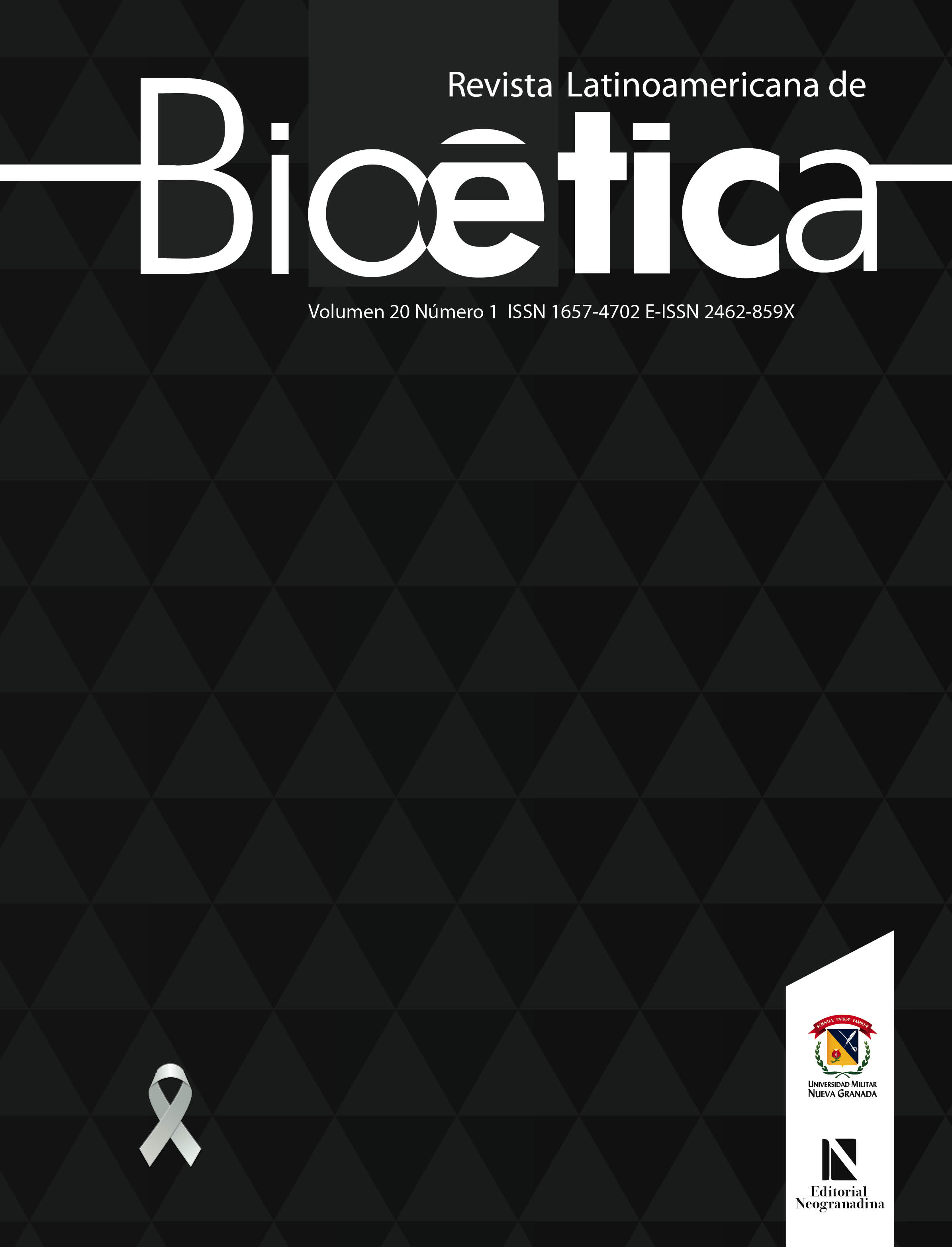Relative caregiver experience facing the death of a child with cancer
Abstract
The objective of this study is to describe the relative caregiver’s experience when facing the death of a child with cancer. With this purpose, the Colaizzi's descriptive phenomenological method was used in a qualitative study including 18 participants meeting the inclusion criteria of being parent to a child with cancer who died in a period from 5 months to 5 years. In-depth interviews were performed until reaching theoretical saturation. As a result, 6 topics describing the caregivers experience were found: idealization of the sick child, perpetual battle, unbreakable bond, loss of sense, get up and move on, and spiritual struggle; representing the perception and experience of caregivers in mourning. It was concluded that expressions of pain, uncertainty and emptiness are feelings and sensations described by the caregivers, which are part of the mourning process, but also describe their movement to acceptance and transcendence, where they give importance to the spiritual being of the child as the way to believe cheats still next to them.
Downloads
References
Organización Mundial de la Salud. International Childhood Cancer Day: 15 February 2018 [Internet]; 2018. Disponible en: https://www.who.int/cancer/iccd-2018/en/
Piñeros M, Gamboa O, Suárez A. Mortalidad por cáncer infantil en Colombia durante 1985 a 2008. Rev Panam Salud Pública. 2011; 30(1): 15-21.
Jalmsell L, Kontio T, Stein M, Henter JI, Kreicbergs U. On the child's own initiative: parents communicate with their dying child about death. Death studies. 2015; 39(2): 111-117. Disponible en: https://doi.org/10.1080/07481187.2014.913086 PMid: 25153166
Alam R, Barrera M, D'Agostino N, Nicholas DB, Schneiderman G. Bereavement experiences of mothers and fathers over time after the death of a child due to cancer. Death Studies. 2012; 36(1): 1-22. Disponible en: https://doi.org/10.1080/07481187.2011.553312 PMid: 24567992
Vega P, Rivera S, González R. El transitar del sobrevivir al revivir: comprender la vivencia de padres y madres que han perdido a sus hijos a causa del cáncer. Rev Chil Ped. 83(3); 247-57. Disponible en: https://doi.org/10.4067/S0370-41062012000300006
García V, Rivas E. Experiencia de enfermeras intensivistas pediátricas en la muerte de un niño: vivencias, duelo, aspectos bioéticos. Cienc Enf. 2013; 19(2): 111-24. Disponible en: https://doi.org/10.4067/S0717-95532013000200011
Dokken D. Making meaning after the death of a child: bereaved parents share their experiences. Pediatr Nurs. 2013; 39(3): 147-50.
Rosenberg AR, Dussel V, Kang T, Geyer JR, Gerhardt CA, Feudtner C, Wolfe J (2013). Psychological Distress in Parents of Children With Advanced Cancer. JAMA Pediatr. 2013; 167(6): 537-543. Disponible en: https://doi.org/10.1001/jamapediatrics.2013.628 PMid: 23545569 PMCid: PMC4263253
Yoshida S, Amano K, Ohta H, Kusuki S, Morita T, Ogata A, Hirai K. A comprehensive study of the distressing experiences and support needs of parents of children with intractable cancer. Jpn J Clin Oncol. 2014; 44(12): 1181-8. Disponible en: https://doi.org/10.1093/jjco/hyu140 PMid: 25249378
Barreto P, Yi P, Soler C. Predictores de duelo complicado. Psicoonc. 2008; 5(2-3): 383-400.
Correa IC. Duelo por pérdida de un hijo(a): historia de vida de padres y madres de la Fundación Lazos Medellín. EN-Clave Social. 2013; 2(2): 70-78.
Kersting A, Brähler E, Glaesmer H, Wagner B (2011). Prevalence of complicated grief in a representative population-based sample. Journ Affect Disord. 2011; 131(1-3): 339-343. Disponible en: https://doi.org/10.1016/j.jad.2010.11.032 PMid: 21216470
Maccallum F, Galatzer IR, Bonanno GA. Trajectories of depression following spousal and child bereavement: A comparison of the heterogeneity in outcomes. Journ Psych Res. 2015; 69: 72-79. Disponible en: https://doi.org/10.1016/j.jpsychires.2015.07.017 PMid: 26343597
Colombo G. (2018). Estilos de afrontamiento y su relación con el estrés en padres con hijos menores de edad con diagnóstico de cáncer. Psocial. 2018; 4(1): 82-94.
Navea A, Tamayo JA (2018). Características de la resiliencia familiar en pacientes oncológicos pediátricos: una revisión sistemática. Psicooncología. 2018.; 15(2): 203-216. Disponible en: https://doi.org/10.5209/PSIC.61431
Cacciatore J, Froen F, Killian M. The effects of self-blame on anxiety and depression among women who have experienced stillbirth. Journ Ment H Couns. 2013; 35(4): 342-359. Disponible en: https://doi.org/10.17744/mehc.35.4.15427g822442h11m
Stroebe M, Stroebe W, Van de Schoot R, Schut H, Abakoumkin G, Li J. Guilt in bereavement: the role of self-blame and regret in coping with loss. PloS One. 2014; 9(5): e96606. Disponible en: https://doi.org/10.1371/journal.pone.0096606 PMid: 24819238 PMCid: PMC4018291
Alameda A, Barbero J. El duelo en padres del niño oncológico. Psicooncología. 2009; 6(2-3): 485-498.
Cruz-J de J (2017). El concepto de experiencia en Victor W. Turner, E. P. Thompson y Anthony Giddens: Un diálogo entre antropología social, historia y sociología. Soc Hist. 2017; (7): 345-375.
Colaizzi PF. Reflection and research in psychology; a phenomenological study of learning. Dubuque, Iowa, Kendall/Hunt Pub. Co; 1973.
Hernández R, Fernández C, Baptista P. Metodología de la Investigación. Mexico: MacGraw-Hill; 2014.
Noreña A, Alcaraz N, Rojas J, Rebolledo D (2012). Aplicabilidad de los criterios de rigor y éticos en la investigación cualitativa. Aquichan. 2012; 12(3). Disponible en: doi:10.5294/1824 Disponible en: https://doi.org/10.5294/aqui.2012.12.3.5
Colaizzi PF (1978). Psychological research as the phenomenologist views it. In: Ronald S. Valle y Mark King (eds.), Existential-Phenomenological Alternatives for Psychology. New York: Oxford University Press. p. 48-71.
Guba EG, Lincoln YS (1994). Competing paradigms in qualitative research. Handb Qual Res. 1994; 2(163-194): 105.
Consejo De Organizaciones Internacionales (Cioms y OMS). Ethical Guidelines for Biomedical Research on Human Beings. Geneva; 2002.
Congreso de la República de Colombia. Ley 911 de 2004. Colombia: Diario Oficial No. 45.693; 2004.
Gilmer MJ, Foster TL, Vannatta K, Barrera M, Davies B, Dietrich MS et al. Changes in parents after the death of a child from cancer. Journ Pain Symptom Manag. 2012; 44(4): 572-82. Disponible en: https://doi.org/10.1016/j.jpainsymman.2011.10.017 PMid: 22784555 PMCid: PMC3463758
Pascual AM, Santamaría JL. Proceso de duelo en familiares y cuidadores. Rev Esp Geriatr Gerontol. 2009; 44(S2): 48-54. Disponible en: https://doi.org/10.1016/j.regg.2009.05.012 PMid: 19837483
Riley, LP, La Montagne LL, Hepworth JT, Murphy BA. Parental grief responses and personals growth following the death of a child. Death Studies. 2007; 31(4): 277-299. Disponible en: https://doi.org/10.1080/07481180601152591 PMid: 17378106
Kelley MM, Chan KT. Assessingthe role of attachment to God, meaning, and religious coping as mediators in the grief experiencia. Death Studies. 2012; 36(3): 199-227. Disponible en: https://doi.org/10.1080/07481187.2011.553317 PMid: 24567979
Montoya J. Pérdida, aflicción y luto: manual para la recuperación. México: Trillas; 2012.
Brandstätter M, Kögler M, Baumann U, Fensterer V, Küchenhoff H, Borasio GD, Fegg MJ. Experience of meaning in life in bereaved informal caregivers of palliative care patients. Sup Care Cancer. 2014; 22(5): 1391-9. Disponible en: https://doi.org/10.1007/s00520-013-2099-6 PMid: 24382677
Correa M, Granero J, Hernandez JM, Fernandez C. Transferring palliative-care patients from hospital to community care: A qualitative study. At Prim. 2016; 49(6), 326-34. Disponible en: https://doi.org/10.1016/j.aprim.2016.09.003 PMid: 27842728 PMCid: PMC6876029
Peiró G, Corbellas C, Blasco A. El duelo en la pérdida de un hijo. En: Camps C, Sánchez PT, eds. Duelo en Oncología. Madrid, España: Sociedad Española de Oncología Médica; 2007. p. 85-101.
Endo K, Yonemoto N, Yamada M. Interventions for bereaved parents following a child's death: A systematic review. Palliat Med. 2015; 29(7): 590-604. Doi: 10.1177/0269216315576674 Disponible en: https://doi.org/10.1177/0269216315576674 PMid: 25805741
Foster TL, Gilmer MJ, Davies B, Dietrich MS, Barrera M, Fairclough DL (2011). Comparison of continuing bonds reported by parents and siblings after a child's death from cancer. Death Studies. 2011; 35(5): 420-40. Disponible en: https://doi.org/10.1080/07481187.2011.553308 PMid: 24501854 PMCid: PMC3918682












